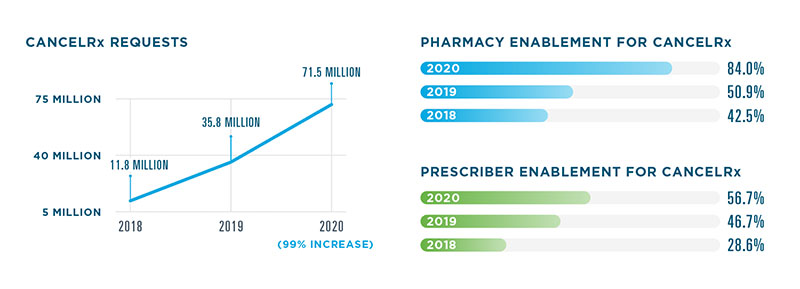It always amazes me how a seemingly simple innovation can have such a profound impact on patient safety. CancelRx is one such technology, and healthcare is increasingly recognizing that it can mean the difference between a positive outcome and an adverse drug event (ADE).
Recently, a group of health IT leaders came together during a podcast hosted by the Pharmacy Podcast Network to discuss the need for CancelRx and the value it demonstrated in a study conducted by University of Wisconsin-Madison.
A Tale of Two Health Systems, Retail Pharmacy and the Evolution of CancelRx
It happens all day, every day. Prescribers change doses of medications, like anti-hypertensives or those used to treat diabetes—drugs that are frequently associated with ADEs if taken incorrectly. Or they reconsider their original medication decision and need to send a new e-prescription. It quickly becomes difficult—for patients and prescribers alike--to keep track of multiple supplies of the same medications in different dosages, for instance. Too often, prescribers and pharmacists have to rely on patients to know their appropriate medications and dosages. And communications like phone calls to manually discontinue medications are painfully time-consuming, inefficient and prone to the medication being dispensed anyway.
The podcast included Michelle Chui, PharmD PhD, FAPhA, Hammel-Sanders Professor, University of Wisconsin, Charlie Oltman, Program Director, NCPDP Foundation, Tolu Akinwale, Manager, Electronic Prescribing at Walgreens, and Samantha Pitts, MD, MPH, Assistant Professor, Johns Hopkins University.
“Successful implementation of CancelRx, an e-prescribing functionality to electronically communicate medication discontinuation orders between electronic health records and pharmacies, can improve medication safety and reduce adverse drug events.”
This single transaction can prevent a number of problems before they ever touch the patient. And the study clearly demonstrates the power of better, faster, more direct and automated communication between care providers.
“There are instances where a CancelRx is received and processed even before the pharmacy team member is able to complete data entry,” explained Akinwale. “This is very helpful in cases where a prescriber maybe discovered an error immediately after sending an electronic prescription. CancelRx allows the pharmacy to react fairly quickly in this scenario before it makes it to the patient.”
“The timeliness of the delivery of the CancelRx transaction is unmatched by any other communication method.”
Akinwale continued, “CancelRx provides the alignment of a patient’s prescription information across care provider systems, it provides a mechanism to stop error prescriptions and improves our collective ability to ensure that patients are taking the appropriate medication. That to me is the main impact from a patient safety perspective.”
This concept was tested and proven in the study: CancelRx: A Health IT Tool to Decrease Medication Discrepancies in the Outpatient Setting (Wisconsin) to “evaluate the effectiveness of CancelRx to decrease medication discrepancies as described in the first aim.” As Oltman described it, “The purpose of this grant study is to show that replacing the need for the prescriber to pick up the phone and call the pharmacy to manually cancel the prescription with a real-time cancel notification can not only improve workflows, but improve patient safety by stopping unintended dispensing.”
The results of UW Health’s system-wide CancelRx implementation were impressive. Before CancelRx, only about 34% of prescriptions that were discontinued in the clinical setting were also cancelled in the pharmacy. After CancelRx went live, the proportion of successful discontinuations jumped drastically to 93%. Additionally, the amount of time it took to discontinue a medication plummeted from approximately 12 hours to virtually no time at all.
“That 12 hours is very impactful when potentially a prescriber might prescribe something unintentionally in error and wanting to call that prescription back,” explained Chui.
The study went deeper into the issue of opioids. “We also drilled down and looked at the percent of successful discontinuations between non-controlled and controlled meds,” said Chui. “And what we found as well was that actually the proportion of successful medication discontinuations of controlled substances was greater than that of non-controlled substances … CancelRx actually did a good job of reducing the potential for refills of controlled substances, addressing again a major public health crisis.”
Pitts shared some of the results from the phased pilot implementation at Johns Hopkins. “Our pilot [CancelRx] implementation really eliminated the sale of e-prescribed medications that had been discontinued in the EHR.” she said. “So, prior to CancelRx, approximately 10% of prescriptions were actually dispensed after that discontinuation in the EHR, and none were following CancelRx implementation.”
With tremendous benefits to patient safety, workflows and prescriber-pharmacist relationships, the good news is that CancelRx has gained substantial ground on the industry adoption front—especially pharmacy engagement. But there is still plenty of opportunity for growth in the prescriber space.

And for the industry that never stops innovating, the foreseeable future of CancelRx promises to bring even more value. Planned enhancements include the ability to communicate cancellation reasons, prior dispensing information for prescribers and the ability to pass allergy or adverse event information on to pharmacies.
CancelRx is just one powerful technology that directly impacts prescription accuracy and patient safety. Each year, the Surescripts White Coat Award recognizes leaders in prescription accuracy, including those who have implemented CancelRx.
Visit Intelligence in Action to stay engaged with CancelRx and other technologies with the power to improve prescription accuracy and patient safety. And check back in October to find out who will win the 2021 Surescripts White Coat Award.


 Dean Riggott Photography
Surescripts
Dean Riggott Photography
Surescripts



